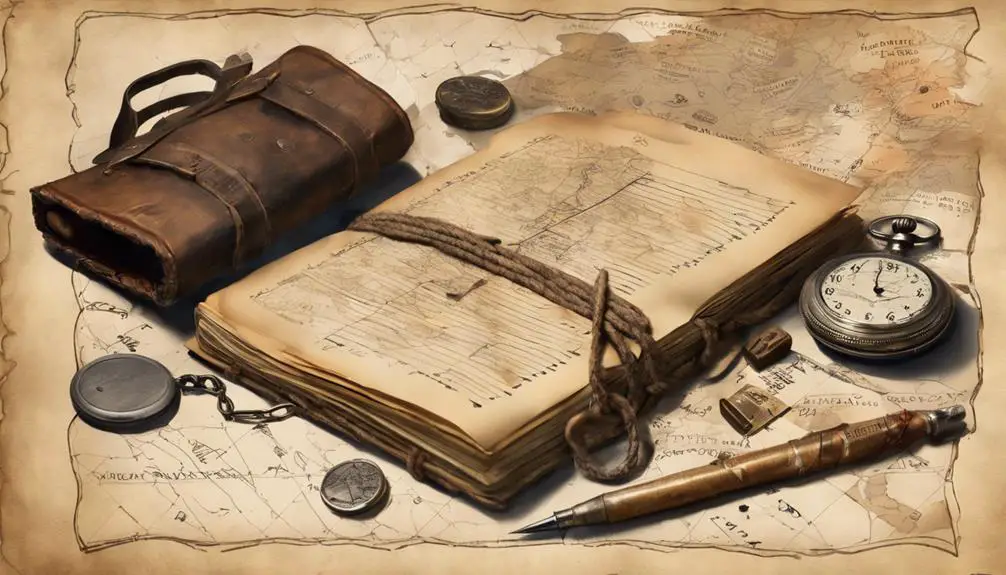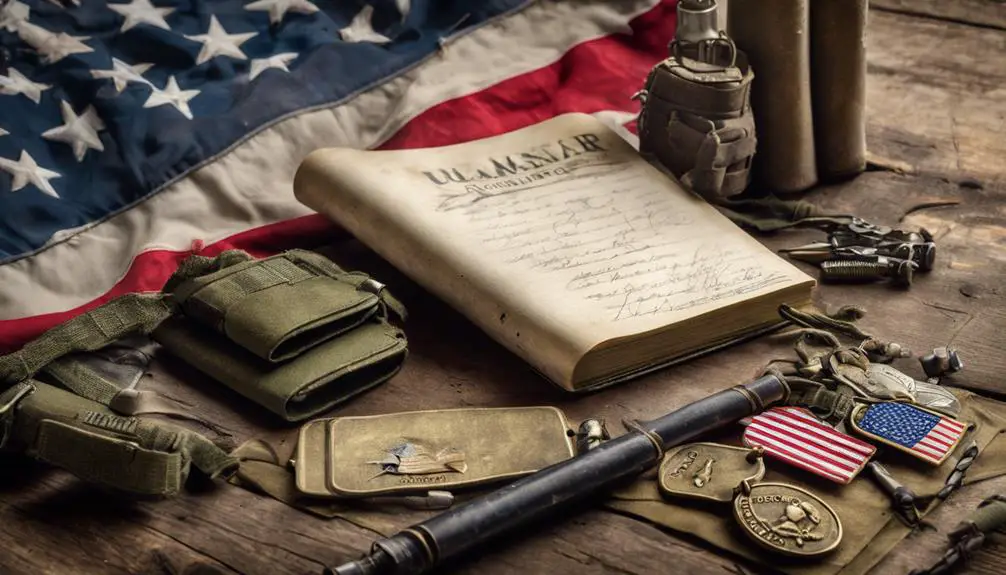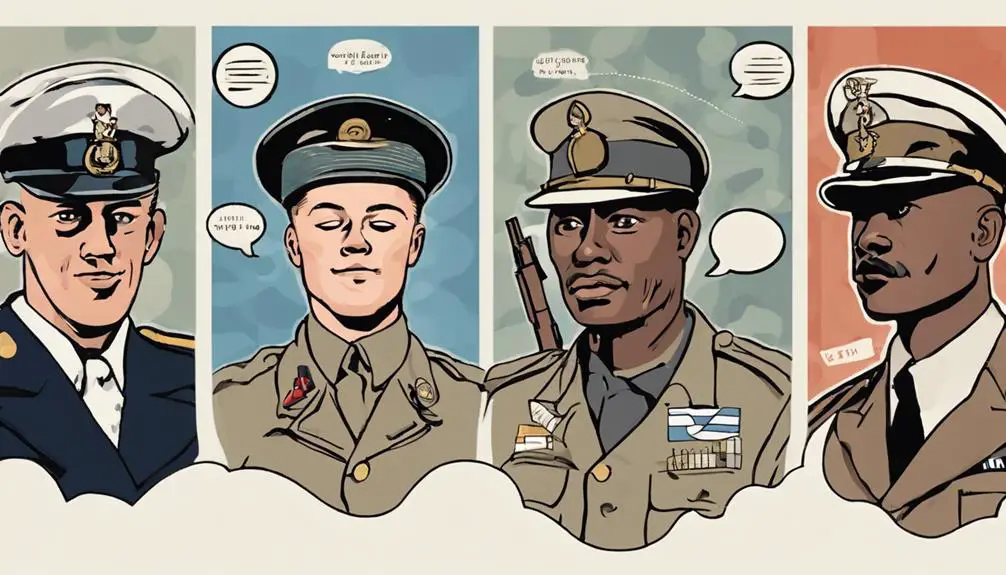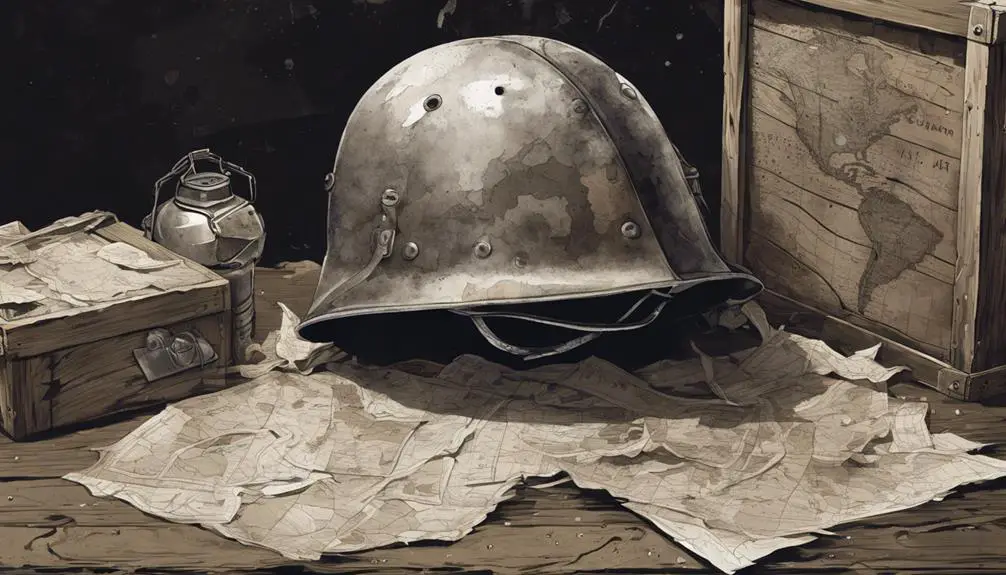You've likely heard military slang terms like 'hooah' or 'SITREP' thrown around in films, TV shows, or by veterans, but understanding the origins and nuances of this language can reveal a deeper appreciation for military culture and communication. Military slang has a rich history, dating back to the 19th century, and has evolved over time, influenced by cultural exchange, technological advancements, and operational necessities. Each branch has its unique jargon, and common phrases like 'hump' and 'squared away' are shared among personnel. Explore the world of military slang to uncover its significance in popular culture and its continued impact on our everyday language.
History of Military Slang

You're about to explore the fascinating world of military slang, and it all begins with its rich history. Military slang has its roots in the early 19th century, when soldiers began using colloquialisms to quickly communicate complex ideas on the battlefield. This etymology analysis reveals that slang emerged as a response to the need for concise communication, which was often a matter of life and death.
As you investigate the cultural influences on military slang, you'll notice that it was shaped by the diverse backgrounds of soldiers. For instance, African American Vernacular English (AAVE) played a major role in the development of military slang, particularly during World War I. The cultural exchange between soldiers from different regions and ethnicities led to the creation of unique phrases and expressions.
Through an etymology analysis, you can see how military slang has evolved over time, influenced by cultural and historical contexts. The use of slang allowed soldiers to create a sense of community and shared identity, which was essential for morale and camaraderie. By examining the history of military slang, you'll gain a deeper understanding of its significance in the military culture.
Slang in Different Branches
As you explore the world of military slang, you'll notice that each branch has its own distinct flavor of jargon. In the Army, you'll hear terms like 'hooah' (meaning 'yes' or 'affirmative') and 'FOB' (forward operating base). This Army Jargon is deeply rooted in the service's history and operational demands.
In contrast, the Navy has its own brand of slang, often referred to as Navy Lingo. You might hear sailors say 'deck' instead of 'floor' or 'head' instead of 'bathroom.' These terms have evolved from the Navy's unique environment and historical context.
The Air Force, Marine Corps, and Coast Guard also have their own distinct slang, shaped by their respective cultures and operational needs. Understanding these branch-specific slang terms can provide valuable insights into the unique characteristics and values of each service.
Common Terms and Phrases

Beyond branch-specific slang, military personnel share a common language, using phrases like 'hump' (to march or walk with a heavy pack), 'squared away' (meaning organized and prepared), and 'high-speed, low-drag' (referring to someone who excels in their duties). These phrases are universally understood across the military, transcending branch-specific terminology.
As you delve deeper into military slang, you'll notice that many phrases have interesting origin stories. For instance, the phonetic alphabet, used to clearly communicate letters and words over radio and phone, has its roots in the early 20th century.
You'll also encounter phrases like:
- ROE: Rules of Engagement, guiding military operations.
- SITREP: Situation Report, providing updates on ongoing operations.
- EOD: Explosive Ordnance Disposal, referring to personnel who defuse explosives.
- FOB: Forward Operating Base, a temporary military outpost.
Understanding these common terms and phrases will give you a deeper appreciation for the complexities of military communication. By recognizing the nuances of military slang, you'll gain insight into the culture and camaraderie that define military personnel.
Slang in Popular Culture
You're likely familiar with military slang's influence on popular culture, where it's frequently used in films, television shows, and literature to add authenticity and grit to characters and storylines.
This incorporation of military lingo serves to create a sense of realism, making the narrative more engaging and immersive. The entertainment industry recognizes the cultural significance of military slang, leveraging it to evoke emotions and build connections with audiences.
By incorporating military slang, creators can convey a sense of authority, expertise, and camaraderie, which resonates with viewers. The influence of military slang extends beyond the screen, permeating everyday conversations and becoming an integral part of contemporary language.
This cultural importance is a reflection of the power of military slang, transcending its original context to become a staple of popular culture. As you engage with your favorite TV shows, movies, and books, take note of how military slang is used to shape characters and narratives, adding depth and complexity to the stories you love.
Evolution of Military Lingo

As military slang continues to permeate popular culture, its evolution reveals a complex interplay between historical events, technological advancements, and cultural exchange, shaping the language of the armed forces over time.
You might wonder how military lingo has adapted to changing circumstances. The answer lies in the dynamic nature of military culture, which has consistently borrowed from and influenced civilian language.
Here are 4 key factors driving the evolution of military slang:
- Global deployments: Exposure to foreign languages and cultures has led to the adoption of new words and phrases, facilitating communication across language barriers.
- Technological advancements: The development of new equipment and systems has introduced novel terminology, such as 'drone' and 'cyberwarfare.'
- Cultural assimilation: The integration of diverse personnel has enriched military language with slang from various ethnic and regional backgrounds.
- Operational necessities: The need for secrecy and brevity has led to the creation of coded language, such as 'covert ops' and 'sitrep.'
Frequently Asked Questions
How Do Military Personnel Use Slang to Maintain Operational Security?
When you're in the field, maintaining operational security is vital. You use slang to keep sensitive info under wraps. Think of it like a Code Talk, where only your team understands the lingo.
Secure Comms are key, and slang helps keep them, well, secure. By using coded language, you guarantee that only authorized personnel are in the know.
It's not about being secretive, it's about being safe.
Are Military Slang Terms Used Universally Across All Military Bases?
You might think that military slang terms are universally understood across all bases, but that's not entirely accurate. The reality is that cross-cultural differences and base-specific dialects play a significant role in shaping the slang used by military personnel.
While some terms may be widely understood, others are unique to specific bases or regions, making it essential to take into account the local context when communicating effectively.
Can Military Slang Be Used in Formal Military Communications?
When communicating formally, you should stick to standard language, avoiding colloquialisms and slang. However, there are exceptions.
In formal military communications, you might encounter slang terms that have become widely accepted, like 'SITREP' for situation report. These slang exceptions are often used for brevity and clarity, but understanding when to use formal language and when a bit of slang is acceptable is crucial.
Do Military Slang Terms Vary Greatly Between Enlisted and Officers?
You might assume that communication styles wouldn't differ greatly between enlisted personnel and officers, but that's not the case. In reality, rank differences and social dynamics play a significant role in shaping language use.
You'll find that the informal language and slang used by enlisted personnel often reflect their camaraderie and shared experiences. In contrast, officers tend to use more formal language, adhering to protocol and maintaining a professional tone.
This dichotomy highlights the varying communication styles within the military hierarchy.
Are There Any Military Slang Terms That Are Specific to Certain Mos?
When you immerse yourself in the world of job-specific lingo, you'll find that certain MOS dialects are unique to specific roles.
For instance, in aviation, terms like 'birds' for aircraft and 'flight deck' for the cockpit are common.
Similarly, in medical units, you'll hear terms like 'trauma bay' and 'scrub in.'
These specialized vocabularies are essential for efficient communication within each MOS, and they add to the rich tapestry of military language.
Conclusion
As you reflect on the world of military slang, remember that 'an army marches on its stomach' – and its language.
From 'FNG' to 'HOOAH', these terms have become an integral part of military culture.
As you've seen, each branch has its unique flavor, and popular culture has picked up on the lingo.
As the military evolves, so does its language.
Stay vigilant, and you'll catch the nuances of military slang, a true reflection of the camaraderie and esprit de corps that defines the armed forces.







